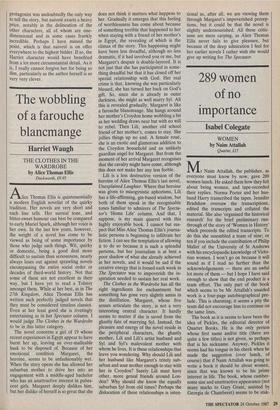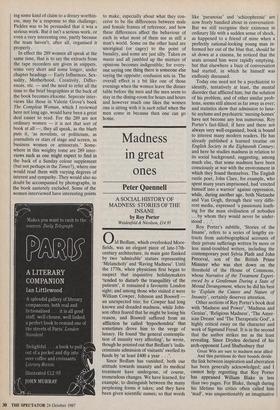289 women of no importance
Isabel Colegate
WOMEN by Naim Attallah
Quartet, £15
Mr Naim Attallah, the publisher, as everyone must know by now, gave 289 women lunch. He asked them how they felt about being women, and tape-recorded their replies. Norma Porter and her hus- band Harry transcribed the tapes. Jennifer Bradshaw oversaw the transcriptions, edited the transcripts and collated the material. She also 'organised the historical research' for the brief preliminary run- through of the story of 'Women in History' which preceeds the edited transcripts. To do this she assembled a team of nine; or ten if you include the contribution of Philip Mallet of the University of St Andrews with his encyclopaedic knowledge of Victo- rian women. I won't go on because it will sound as if I read no further than the acknowledgements — there are an awful lot more of them — but I hope I have said enough to show that the end product is a team effort. The only part of the book which seems to be Mr Attallah's unaided work is a four-page autobiographical pre- lude. This is charming; it seems a pity the team did not encourage him to continue on the same lines.
The book as it is seems to have been the idea of Pickles, the editorial director of Quartet Books. He is the only person whose first name and/or title (there are quite a few titles) is not given, so perhaps that is his nickname. Anyway, Pickles it seems had his tongue in his cheek when he made the suggestion (over lunch, of course) that if Naim Attallah was going to write a book it should be about women, since that was known to be his prime interest in life. The book, whose cumber- some size and unattractive appearance (not many marks to Gary Grant, assisted by Georgia de Chamberet) seems to be stak- ing some kind of claim to a dreary worthin- ess, may be a response to this challenge; Pickles was to be persuaded that it was a serious work. But it isn't a serious work, or even a very interesting one, partly because the team haven't, after all, organised it properly.
In effect the 289 women all speak at the same time, that is to say the extracts from the tape recorders are given in snippets, some very short and some longer, under chapter headings — Early Influences, Sex- uality, Motherhood, Creativity, Differ- ences, etc. — and the need to refer all the time to the brief biographies at the back of the book becomes irksome. Seperate inter- views like those in Valerie Grove's book The Compleat Woman, which I reviewed here not long ago, would have been a great deal easier to read. For the 289 are not ordinary women — it is not that sort of book at all —, they all speak, as the blurb puts it, 'as novelists, or politicians, as journalists or stars of stage and screen, as business women or aristocrats.' Some- where in this weighty tome are 289 inter- views such as one might expect to find in the back of a Sunday colour supplement (but not perhaps in the Times?), where one would read them with varying degrees of interest and sympathy. They would also no doubt be accompanied by photographs, in the book austerely excluded. Some of the women interviewed have interesting points to make, especially about what they con- ceive to be the differences between male and female frames of reference, and how these differences affect the behaviour of each in what most of them see as still a man's world. Some on the other hand are unoriginal (or cagey) to the point of banality, and some are just silly. Taken en masse and all jumbled up the mixture of opinions becomes indigestible; for every- one saying one thing there is someone else saying the opposite; confusion sets in. The overall effect is a bit like one of those evenings when the women leave the dinner table before the men and the men seem to stay in the dining-room for hours and hours and however much one likes the women one is sitting with it is such relief when the men come in because then one can go home.



















































 Previous page
Previous page